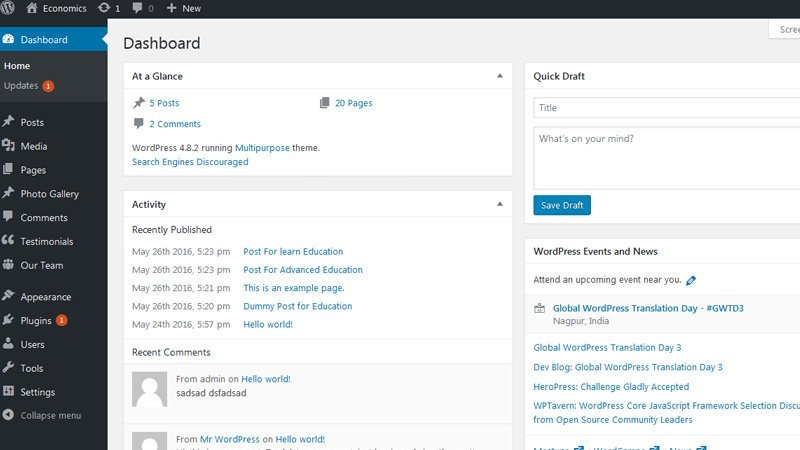WordPress is an open-source content management system (CMS). It’s a popular tool for individuals without any coding experience who want to build websites and blogs. The software doesn’t cost anything. Anyone can install, use, and modify it for free.

What is WordPress used for?
In the beginning, WordPress was mainly used to create blogs. Fast-forward to today, the software has improved, and you can create any type of website you want. You can build hobby or lifestyle blogs, professional portfolios, business websites, e-commerce stores, mobile applications, and membership sites.
Professional Portfolios
You can also find a variety of themes for professional portfolios, making WordPress a great choice for showcasing your personal brand. The “Pages” functionality can be used for your homepage, About page, contact page, etc. while the “Posts” functionality can be used for the specific pieces you want to highlight — whether they’re in image, text, audio, or video format.
Business Websites
A business website needs to get even more mileage out of WordPress, in many cases having more pages and posts than the average personal blog or site and needing additional functionality. However, due to its powerful built-in CMS capabilities and the open-source community continuing to iterate solutions, WordPress is fantastic at meeting those needs.
You can choose a website theme that works best for what you’re looking to accomplish and then customize it according to your brand. Page builders such as Elementor and Divi make the layout process even easier.
E-Commerce Stores
WordPress is particularly good for creating online stores. With e-commerce plugins such as WooCommerce, you can manage products, payments, and shipping in the back end while your visitors have an enjoyable shopping experience on the front end.
Mobile Applications
It can be far more convenient for some users to access your site’s features through a mobile app rather than their device’s browser. App development can be costly, but WordPress plugins can turn your site into an app with no hassle.
Why Use WordPress?
WordPress is the beloved platform for many bloggers and businesses. In fact, more than 40% of all websites online use WordPress. Here are a few reasons why WordPress is so popular:
1. WordPress is open-source.
WordPress is an open-source platform. This means anyone can modify the source code and redistribute the software. It’s designed for people to contribute their ideas to improve the platform. There’s an open-source community that helps make WordPress even better.
2. WordPress is easy to use for a beginner.
WordPress doesn’t require a computer engineering degree. It’s actually built for non-technical people. The user interface is intuitive and friendly. To add a new design to your website, you can simply download a theme. If you need to add a new function, like a contact form, you just install a plugin. Web development tasks that used to take hours to complete can be done in a matter of minutes.
3. WordPress is SEO-friendly.
It’s not enough to just build a WordPress website. You want people to find and visit your website through search engine optimization. With SEO plugins, like Yoast SEO, you can boost your rankings with internal linking suggestions and meta description templates.
4. WordPress supports all media types.
WordPress doesn’t limit any major media types. So, you can use any combination of text, images, and videos on your website. In this competitive market for consumers’ attention, it’s good to know that the platform gives you creative freedom.
5. WordPress is secure.
Security is a major concern for businesses. With the number of data breaches happening every year, you want peace of mind that your data (and your customers’ data) will be protected. As long as you keep plugins updated and passwords secure, WordPress is one of the safest and secure CMS platforms. The platform offers several features to safeguard your website, like logging out idle users and adding two-factor authentication.
6. WordPress is free to use.
WordPress is completely free. It won’t cost you anything to use the software. However, you will need to pay a third-party hosting provider to make your website available online.
Resources to Build Your WordPress Website
It’s easy to get overwhelmed when building your website. There are so many options when it comes to hosting providers, page builders, and plugins. We narrowed down the list to get you started.
- WP Engine provides managed WordPress hosting for your website. Built for agencies, enterprises, and small businesses, this company offers a secure and reliable service.
- WPMU Dev is an all-in-one WordPress platform. You get everything from hosting to security protection to marketing tools to help you run a successful website.
- All in One SEO is a complete SEO plugin and toolkit for WordPress. With its TruSEO score and actionable checklist, you can easily optimize every page and post on your website for higher search engine rankings.
- WooCommerce helps you build an online business easier. This e-commerce platform includes unrestricted customization and built-in blogging to help your business grow.
- Elementor boasts more than 3 million websites using its WordPress page builder. With no technical skills, you can design stunning web pages from pre-made templates.
- GravityForms lets you create advanced forms with its visual editor. Convert more visitors with its conditional logic feature that configures your forms to show or hide fields based on the visitors’ selections.
- WP Beginner is a free WordPress resource for beginners. Their blog offers advice and tips on how to improve your website.
- The Events Calendar family of WordPress tools gives users free and paid options for calendars, RSVP and ticketing, and comprehensive events management.
5 Tips for Building a WordPress Website
1. Find the right web hosting plan
2. Pick a quality theme
3. Don’t use too many plugins
4. Compress images
5. Prioritize safety
How to Build a WordPress Website
1. Select a WordPress plan (WordPress.com only).
2. Set up your domain name and hosting provider.
3. Install WordPress.
4. Choose your theme.
5. Add posts and pages to your website.
6. Customize your website.
7. Install plugins.
8. Optimize your website to increase page speed.
9. Get inspired from WordPress website examples.




